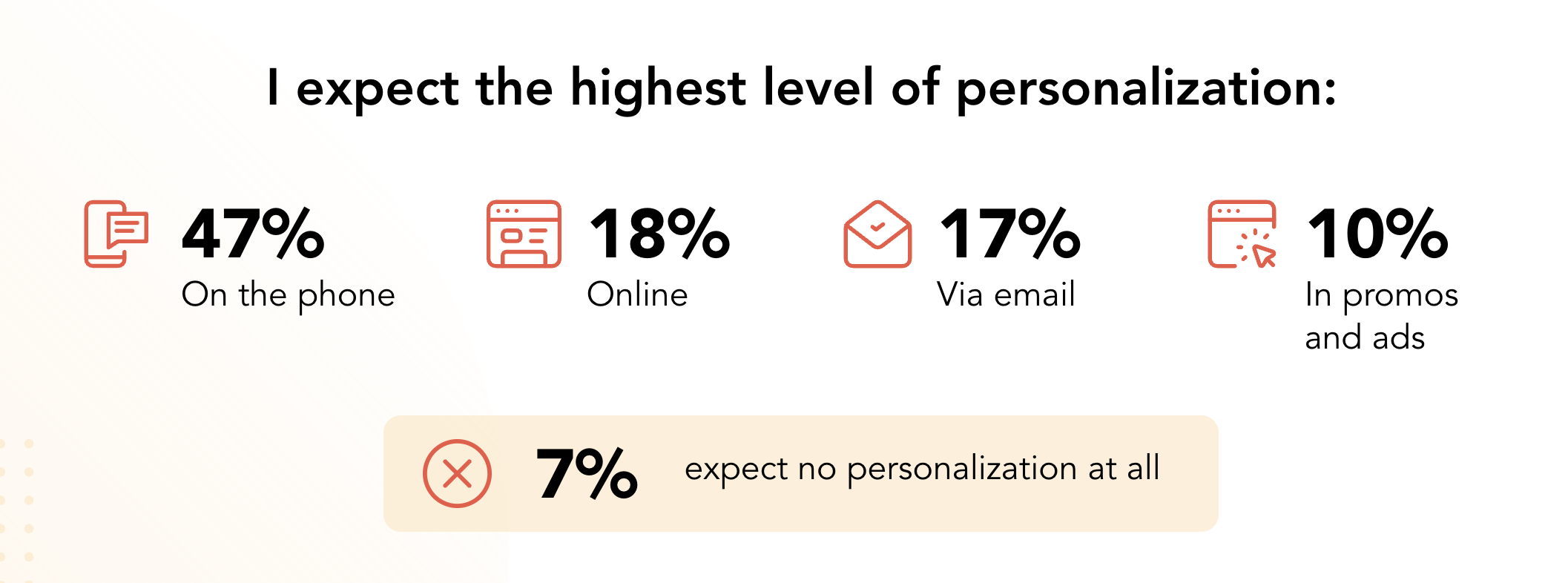The majority of healthcare consumers start their journey by finding and comparing providers online, usually through search. When they’ve completed their research, they typically convert by calling.
To acquire more patients, healthcare marketers are optimizing their channels to drive more appointment calls. Cutting-edge teams are also personalizing the caller experience to increase conversions.
Read on to learn what healthcare marketers have planned for 2026 and beyond.
The Healthcare Patient Journey Often Begins Online
- 5% of all Google searches are health-related. Google is a trusted resource for people worldwide to get answers to health-related questions and find providers. (Source: Google)
- Search drives 3x more visitors to hospital sites compared to non-search. Search is by far the preferred way for patients to find healthcare providers online. (Source: Google)
- Patients who booked healthcare appointments ran 3x more searches than those who didn’t. The healthcare consumer journey often involves extensive research — consumers evaluate numerous providers before taking action. (Source: Google)
- Consumers researching physical therapists, nursing homes, and optometrists are the most likely to use search engines. In most major healthcare verticals, over 60% of consumers run a search before scheduling an appointment. (Source: LSA)

- The average email open rate for the healthcare industry is 21.48%, with an average click-through rate of 2.69%. We encourage healthcare marketers to personalize outreach based on individual preferences and data, which call intelligence can facilitate. (Source: Digitalis)
- Nearly all Americans (90%) are using social media for health information. This showcases a dramatic shift in how people search for healthcare knowledge. (Source: HealthGrades)
Online Reviews Are an Important Piece of the Healthcare Purchase Cycle
- 94% of healthcare patients use online reviews to evaluate providers. Reading reviews is an easy first step for prospective patients to get a feel for your practice. (Source: Software Advice)
- Almost half of patients surveyed are willing to go outside their insurance network for a healthcare provider with glowing online reviews. This suggests reviews carry significant weight in patient decision-making. (Source: HealthGrades)
- 84% of consumers trust reviews as much as personal recommendations. Having a strong review management strategy is crucial for acquiring new patients. (Source: Inc.)
- It only takes 1-6 online reviews for potential patients to form an opinion about your practice. A single bad review can deter numerous prospective patients. (Source: RevLocal)
- 81% of consumers are unsatisfied with their healthcare experience. To maintain positive reviews, encourage satisfied patients to leave reviews and mend relationships with dissatisfied patients. (Source: Prophet)
- 43% of Millennials are likely to switch practices in the next few years. Providing a top-notch experience for this demographic is important not just for your review strategy, but also for patient retention. (Source: SolutionReach)
Healthcare Marketers Are Investing More in Digital Ads to Acquire New Patients
- 88% of U.S. healthcare marketers say they plan to increase their digital ad spending in 2026. This is a major increase from the 61% last year who said they'd increase spend on this channel. (Source: eMarketer)
- Healthcare digital advertising spend overtook healthcare TV ad spend for the first time in 2021. At that time, healthcare digital advertising spend accounted for 46% of all healthcare ad spend. (Source: Zenith Media)

- The average cost for a healthcare lead is $286. With digital ad spend on the rise, healthcare marketers are paying more for each lead. (Source: HubSpot)
- U.S. healthcare advertising expenditure is projected to rise from $22.4 billion in 2022 to $29.2 billion by 2028. This signals to healthcare marketers a booming industry with growing budgets, highlighting a massive opportunity for impactful marketing campaigns. (Source: NYT Licensing)
- Despite a meager 6.11% click-through rate, hospitals dedicate a staggering 85% of their marketing budget to Google Ads. This shows a potential need for diversifying strategies for better return on investment. (Source: HealthGrades)
Many Healthcare Patients Researching Online Convert by Calling
- 88% of healthcare appointments are scheduled by phone. Prospective patients who research online prefer to call because healthcare is personal and private. People booking healthcare appointments for themselves, their children, or other family members want to speak to a real human being. (Source: Sequence)
- 2.4% of healthcare appointments are scheduled online. Many patients are reluctant to type their personal health information or reason for their appointment into an online form. (Source: Accenture)
- Consumers researching nursing homes, physical therapists, and chiropractors are the most likely to call healthcare providers after performing a search. In many healthcare verticals, consumers transition directly from online searches to phone calls. Learn more senior care marketing statistics here. (Source: LSA)

There Is Huge Revenue Potential in Optimizing Your Marketing to Drive More Calls
- Calls will influence $1 trillion in US consumer spending this year. In our mobile-first world, calls are often the most convenient way for customers to convert. (Source: BIA/Kelsey)
- Phone calls convert to 10-15x more revenue than web leads. Calls are the most valuable conversions healthcare marketers can drive. By tracking the calls driven by your healthcare ads, you can measure your full ROI and optimize accordingly. (Source: BIA/Kelsey)
- Callers convert 30% faster than web leads. Calls provide a more immediate return on your healthcare marketing investment. (Source: Forrester)
- Caller retention rate is 28% higher than web lead retention rate. Driving calls from healthcare marketing campaigns is also more profitable in the long-term — callers are more loyal than web leads. (Source: Forrester)
- 45% of healthcare marketers report phone calls have higher conversion rates with larger order value (AOV) compared to other forms of engagement. Phone calls are often the most valuable marketing conversions for healthcare providers. (Source: Forrester)
- 33% of healthcare providers report having increased phone conversion rates by 25% or more in the past 12 months. Not only are patients calling more due to COVID-19 — they’re also calling with higher intent to schedule treatment. Both the volume and value of calls are increasing for many healthcare providers due to COVID-19. (Source: Forrester)
- 81% of healthcare marketers believe inbound calls and phone conversations are a key component of their organization’s digital-first strategy. Healthcare marketers plan to tap into phone call data to better understand their patients and inform their strategies. (Source: Forrester)
- 77% of healthcare marketers say insights from inbound calls and call experiences may reveal costly blind spots in our organization. Data from inbound calls can help healthcare marketers acquire more patients and create better experiences to retain them. (Source: Forrester)
- 76% of patients called at some point during their healthcare journey. This is a 9% increase from last year and the trend is expected to continue. (source: Invoca)
- The most common reasons patients call healthcare providers are to gather more information about the service and the purchase process. Patients also call because they aren't comfortable sharing personal healthcare information in a web form and prefer the personal touch of a phone call. (source: Invoca)

Healthcare Marketers Are Personalizing the Caller Experience to Boost Conversions
- 80% of customers say the experience a company provides is as important as its products and services. Expectations for the customer experience have never been higher — to acquire new customers, healthcare marketers need to meet them. This includes calls. (Source: Salesforce)
- 65% of consumers have cut ties with a brand over a single poor customer service experience. If you fail to provide frictionless caller experiences, it will cost you customers. (Source: Digiday)
- 32% of consumers say phone calls are the most frustrating customer service channel. Simply fielding inbound phone calls isn’t enough for healthcare marketers — it’s important to have data on each caller so you can quickly and efficiently address their needs. (Source: Aspect)

- 41% of healthcare marketers have provided or expect to provide enhanced patient experiences as a result of scaling conversation intelligence across the enterprise. With conversation intelligence data, healthcare marketers can enhance ad targeting, segment email campaigns, serve personalized website experiences, and more, based on the content of phone conversations. (Source: Forrester)
- 41% of healthcare marketers have improved or expect to improve patient acquisition and retention as a result of scaling conversation intelligence across the enterprise. When you tailor patient experiences based on the content of their phone conversations, you better meet their needs and earn their loyalty. (Source: Forrester)
- Patients expect higher levels of personalization over the phone than on any other channel. Personalizing the call experience is critical to converting callers to patients. (source: Invoca)

- When a healthcare provider does a good job of personalizing customer interactions, 49% of patients feel like they care about earning their business and 47% are more likely to choose them. Personalization can have a direct impact on patient loyalty. (source: Invoca)

Healthcare Marketers Are Banking on AI to Boost Performance in 2024 and Beyond
- 93% of healthcare marketers are ready to adopt AI, recognizing its potential to transform strategies and deliver outstanding patient experiences. Don't get left in the waiting room — your competitors are already using AI to accelerate their patient engagement efforts. (Source: The State of AI in Digital Marketing Report)
- 91% of healthcare marketers are buzzing with excitement about AI, but anxiety lingers — the fear of falling behind is pervasive. The message is clear: tap into AI's massive potential, or risk being overtaken in the healthcare industry! (Source: The State of AI in Digital Marketing Report)
- 93% of healthcare marketers believe AI will have a positive impact on their organizations, with nearly half anticipating a major transformation. Even cautious healthcare providers see minimal risk, with only 5% expecting no impact. (Source: The State of AI in Digital Marketing Report)
- Over 40% of marketers see AI as a potential job threat, but here's the good news: a whopping 97% believe it will enhance their careers! AI is here to stay, and those who adapt will deliver the most effective care and advance their careers along the way. (Source: The State of AI in Digital Marketing Report)
So What Can Healthcare Marketers Do to Drive More Call Conversions?
- Make it easy for consumers to call you. This includes using call extensions on Google ads and making “call now” an action on web pages.
- Track callers from marketing source to appointment booking. This will help you understand how your digital marketing is generating calls.
- Personalize the caller experience. To convert callers, it’s important to provide a seamless, personalized experience that makes them feel valued and known.
- Analyze conversations to measure what percentage of calls aren’t being answered at each location, if long on-hold times result in high call abandon rates, if the caller was a good lead, if they converted, and which agents or locations are best (and worst) at converting callers to patients. You can then make the appropriate adjustments to your marketing and coach your agents if necessary.
- Integrate call data with your martech tools. In turn, you’ll gain a full view of the patient journey and allocate your budget more effectively.
- Target past callers and lookalikes with the right ads. Your callers provide a wealth of targeting data you can use to more effectively acquire new customers and retarget qualified callers based on whether or not they booked an appointment or converted.
- Optimize, analyze, repeat. Once you start driving more calls, it’s important to continually test and scale your processes, while correcting issues that hurt your ROI.
To learn how you can acquire more new patients, request your personalized demo of Invoca.

.png)
